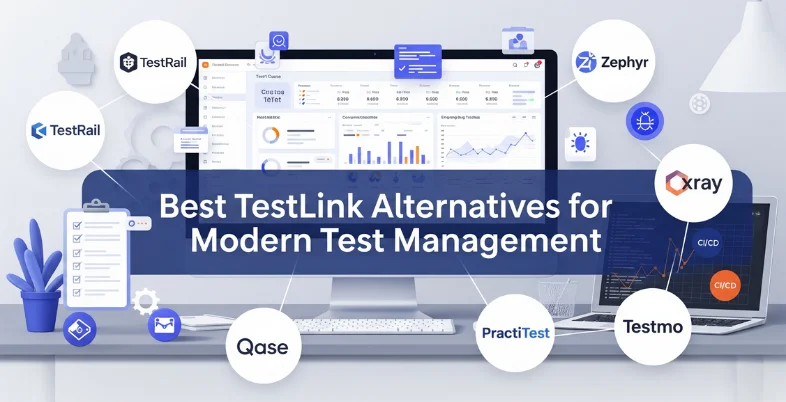Quality test management is a vital aspect of providing quality software, and different tools, such as Testlink, have been a big part of assisting QA teams in organising test plans, cases, and results. Being an open-source platform, Testlink enjoys its popularity because it is flexible and affordable. However, in the current rapid development scenarios, it has become too constrained in various departments, particularly due to integration with the newly designed CI/CD tools, real-time collaboration, convenient interfaces, etc.
In case you want to enhance the testing process you use, it pays to investigate such TestLink Alternatives as this software. Many of the contemporary test management tools support automation, include analytics, integration with other programs (Jira, Git, Selenium, and others), and can be accessed by the distributed team via the cloud. Such tools not only increase productivity but also test coverage and visibility of the project in general.
Be it an upcoming startup wanting to achieve agile processes or a bigger company looking to support massive-scale test setups, just the right alternative can make a considerable boost to your QA productivity. In this article, we shall guide you through the top alternatives to testlinks in the market today with highlighting the main features, strengths, and differences between TestLink and these other alternative options.
Why Look for TestLink Alternatives?
- Obsolete interface- The Testlink user interface is not agile for the current agile teams and this may slow down productivity.
- Few Integrations – It does not provide an easy integration with such CI/CD tools as Jenkins, GitHub, or Jira.
- Manual Effort- Maintenance and creation of test cases would usually be more manual, relating to newer tools.
- No Real-Time Collaboration – It lacks live collaboration of off-site or distributed QA teams.
- Weak Automation Support- Has weak automation structures or native test automation combinations.
- Poor Reporting Abilities-There is less monitoring and analysis of testing with few dashboards and analytics.
- Scalability Issues: Does not suit teams that have an expanding test environment or an intricate project.
List of 15 Best Testlink Alternatives
1. Zephyr Enterprise by SmartBear
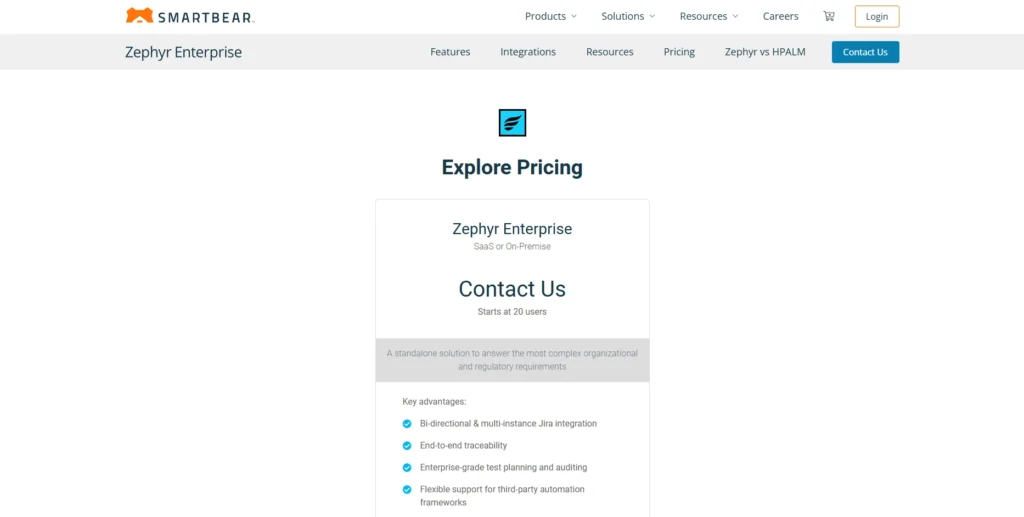
The Zephyr Enterprise comes as a product of SmartBear which is a powerful test management platform specialised in enterprise testing. It can also support extensive planning, running and following defects for several projects and settings. Zephyr can be used through manual or automated testing and fits easily with such tools as Jira, Selenium, Jenkins, SoapUI and LoadUI.
It is compatible with numerous development styles, aiding in agile, waterfall, and hybrid approaches. The platform has strong features about offer deep traceability, real-time reporting, and a customizable dashboard providing a complete overview of QA activity. Despite the possibility of phrase and navigation learning during initial training, strong integration capabilities and a comprehensive feature set make it one of the best tools when dealing with large influential organisations that have to handle complicated testing procedures.
Key Features:
- Test case and bug centralised management
- Whole traceability between tests, releases, and requirements
- Jira, Selenium, Jenkins and SmartBear integrations
- Agile, waterfall and hybrid workflows support
- Real-time test metrics and on-demand Dashboards
- Automation and alternative execution choices at the command line
- The enterprise test environment is scalable
- Strategic decision-making and advanced analytics
- SAFE and tunable platform infrastructure
Pricing:
- custom pricing
2. qTest by Tricentis
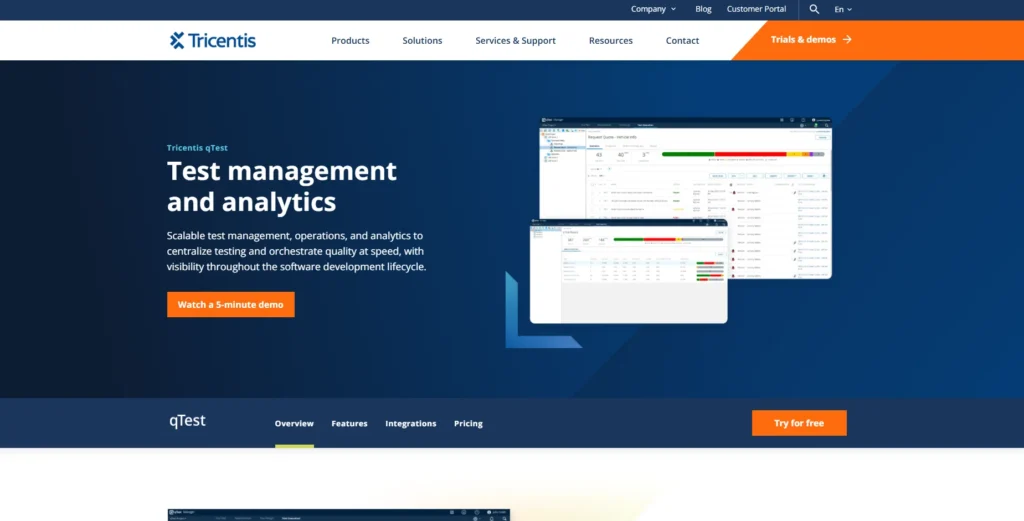
qTest is a broad solution of test management by Tricentis designed to meet the requirements of agile and DevOps teams. It provides a centralised place to prepare, maintain and keep abreast of the manual and automated tests throughout the development cycle. qTest is well-established to handle test planning, execution, and reporting in a single platform where it integrates well with the most popular tools, including Jira, Selenium, and Jenkins.
It also includes native analytics and real-time dashboards, along with Behaviour Driven Development (BDD), which is why it can be a good choice to scale QA practices to work in enterprise settings. The qTest lightens the burden with its straightforward UI and yet provides connection version control, tracing of tests, and cloud-level scaling. This is why it is quite suitable to be used by large and distributed teams that need well-developed functionality, powerful integrations, and cross-team visibility.
Key Features:
- Test case management and release management based on agile
- Live Connections with Jira, Jenkins and Git
- Single repository of both automated and manual tests
- Real-time reporting on custom dashboards
- Version control and tracking of requirements
- Enterprise-ready on-premises or cloud deployable
- Behaviour-driven testing support in native BDD.
- Insights on advanced analytics and test cycle tests
- Fluid compatibility of DevOps and CI/CD pipeline
Pricing:
- custom pricing
3. Testmo
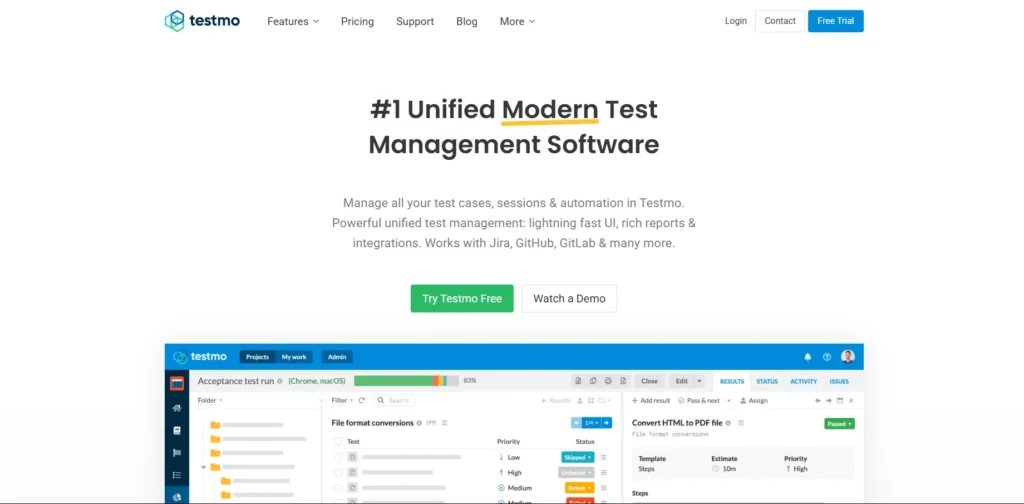
It is a tool that will take control of all your tests, including case control, delving into new problems and running test automation. Made to support current QA teams, users can make changes and run tests and view results of Selenium or Cypress. In Testmo, you will have useful dashboards, reasonable project evaluation and seamless integration with the JIRA and GitHub issue trackers.
The interface is comfortable to work with and makes things efficient as it emphasises speed. The Testmo users can map requirements, use various versions and give permissions. The agile method, as well as traditional approaches to work, is intended to be facilitated by PLM. The tool is more modern, and that is why it stands out due to the new ideas and good performance.
Key Features:
- Single system to test manually, exploratory and automatically
- GitHub, GitLab, JIRA and CI integrations
- Quick tracking and importation of results and tests
- Support for Markdown in test case descriptions
- Project management test and permissions based on the role
- Automation REST API and CLI on click
Pricing:
- Team– $99per month
- Business– $329/ month
- Ent– $549/month
4. TestRail

TestRail aids the QA team by managing their software tests, monitoring and facilitating their software processes. It is simple to operate and lets customers formulate their tests effectively and also lets an organised test case be created and executed along with the meaningful output of the tests. The testing work can be either manual or automated and the tool is also very easy to integrate with JIRA, Jenkins and GitHub.
TestRail assists in the control of data access, allows customising the dashboard, and provides options to track project milestones. I can obtain a comprehensible picture of the progress of testing work and team activity immediately because of its analytics tools. TestRail is also ideal when working with 5 to 20 or more people by sharing the job specifically related to quality assurance but the sophisticated capabilities are not cheap, thus unfriendly to many startups.
Key Features:
- Organised test case management by use of templates
- Personal dashboards and reports on tracking progress
- Native connections with JIRA, Bugzilla and Redmine
- Custom workflow and automation by REST API
- On-premises multi-cloud or on-premise and multipurpose deployment
- The test run scheduling and the role-based authorisation control
Pricing:
- Professional Plan– $38/month
- Enterprise Plan– Personal Pricing
5. TestCollab
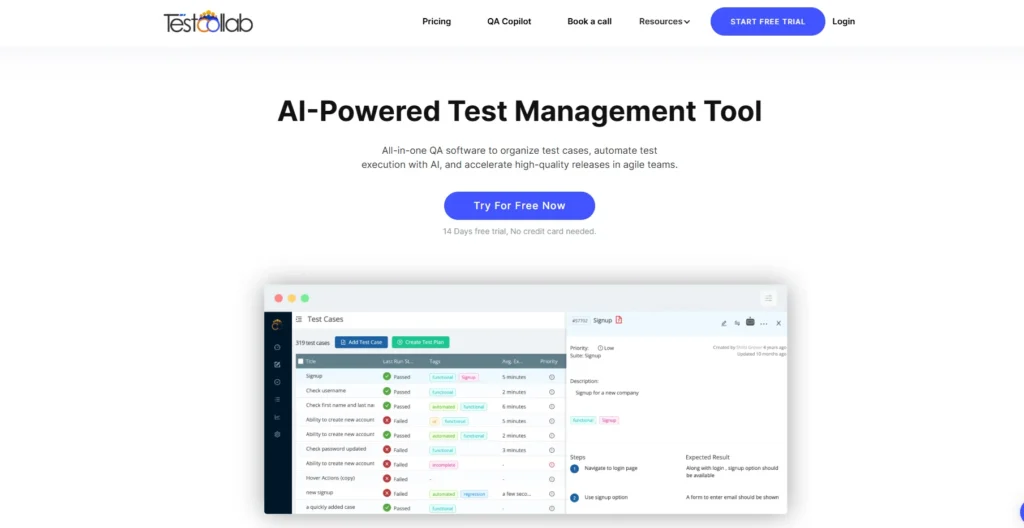
It is designed to work collaboratively in the testing field, and it focuses on usability and other tools. By this, test teams will be able to construct test plans, handle cases and trace the results effectively. TestCollab is created to be complementary to the integration with JIRA, Redmine and other CI/CD tools. Since the users can work in real time, the teams were able to communicate more freely and feedback got to them faster.
This tool has requirements, milestones and useful reporting dashboards. TestCollab will be welcome among those agile groups that will require flexible cloud-based test management. In addition, its simple design and the capacity to slot in alongside current systems are the key reasons why it is so popular among smaller QA teams.
Key Features:
- Requirement and test case management and versioning
- Jenkins and Selenium tools in the CI/CD practice
- Time keeping and defect tracking
- Automation and data synchronisation using REST API
- Slack, GitHub JIRA integration
- Accommodates agile and conventional QA teams
Pricing:
- Premium-$35/ per month
- Elite– $45 per month
- Enterprise-Custom Pricing
6. PractiTest
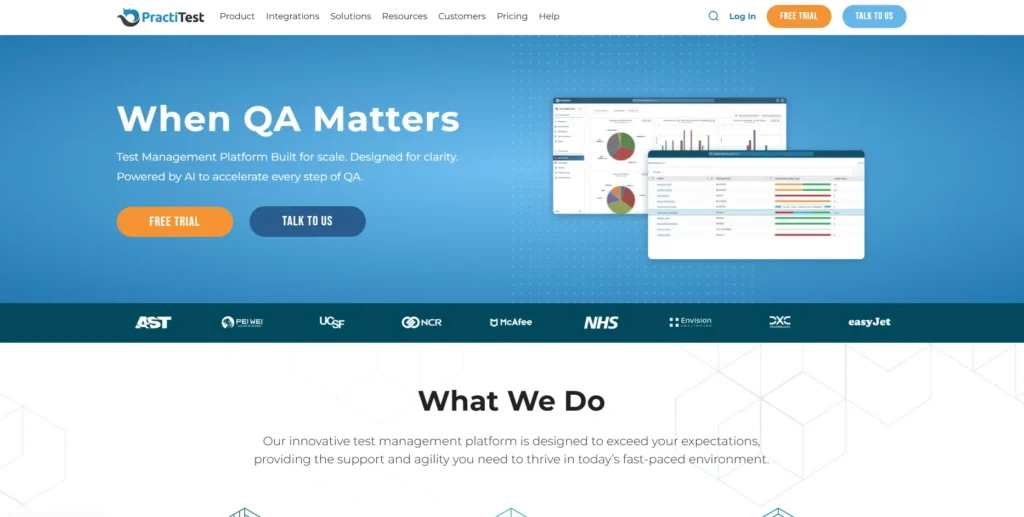
It is one of such platforms that allow you to keep your software testing in view, neat and efficient. The tool allows both manual testing and fully automated testing and provides reports in real-time that can be filtered and linked to issues, requirements and tests. PractiTest integrates with CI/CD and can easily cooperate with JIRA, GitHub and Selenium.
The results can be viewed and decisions can be made by the QA teams owing to the special data structure of this product. Individuals appreciate the fact that PractiTest provides its customers with a highly reliable customer support service, promises them and elaborates on their reports. This is particularly applicable to groups that require implementing the whole test life cycle activities and results.
Key Features:
- The possibilities of custom fields, filters, and workflow options
- Plug-in to JIRA, Jenkins, and GitHub among others
- Real-time dashboards and progressive reporting
- Inbuilt requirements and problem handling
Pricing:
- Team plan: $49/month
- CORPORATE PLAN– Custom Pricing
7. ReQtest
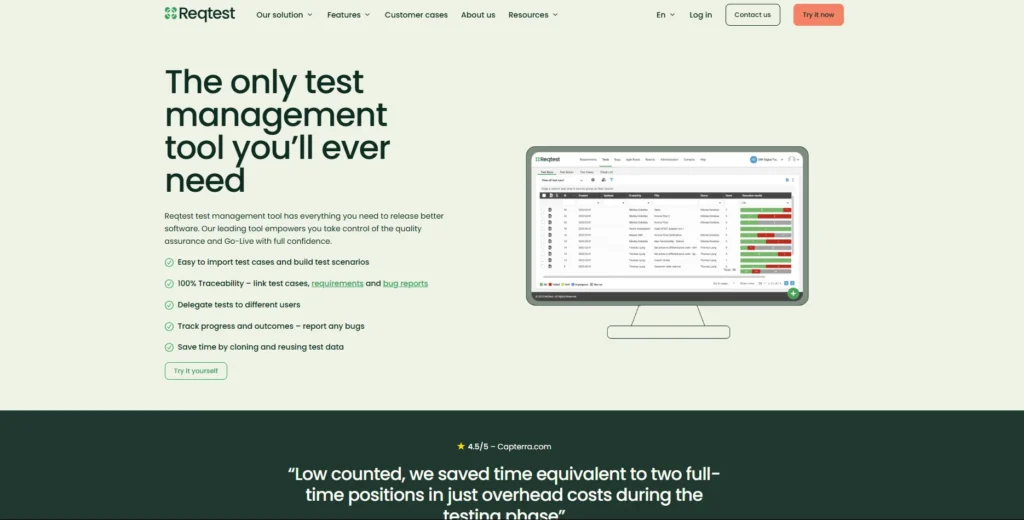
ReQtest operates in the cloud and is deployed to arrange the organisation of testing and requirements regardless of the software development method applied: agile or waterfall. Testable features as well as bugs are dealt with constantly. In ReQtest, collaboration is easy through an easy-to-use dashboard, a useful traceability matrix and immediate reporting. The tool is well compatible with JIRA and other like terminologies.
Although it is simple enough to use by anybody, you will not be able to find the massive customisation options that are present in bigger businesses. ReQtest has been estimated to serve the purpose of small to medium-sized teams hoping that it would offer them easy and efficient options in terms of managing tests and requirements.
Key Features:
- Requirement and test management on the cloud
- Live bug tracking reporting
- Sprint planning Agile board
- Test case Excel-based import/export
- The Creation of custom fields and limited accessibility permission settings
- JIRA syncing to the settings
Pricing:
- custom pricing.
Suggested read:
8. Kualitee
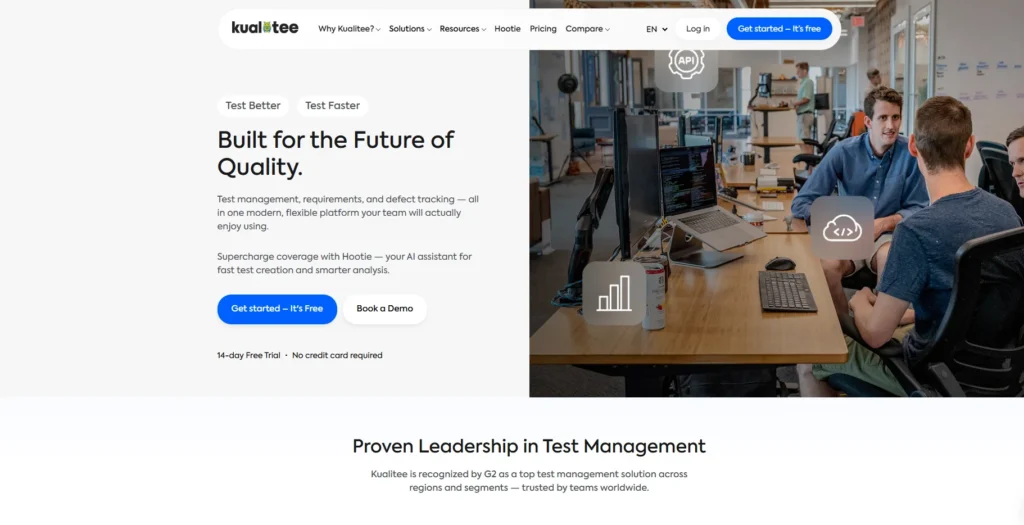
The tool, Kualitee, is supposed to manage the process of testing the products whether the process is manual or automated. It is possible to manage test cases, follow up on your requirements and bug log in a single environment. The tool supports integrations through JIRA, Selenium, Jenkins and GitHub.
On the dashboard provided by Kualitee, one can tell the extent to which the application has been covered by its tests. Kualitee is very useful to teams that are seeking a common front where all sorts of testing can be done in an agile environment. This is due to the de facto system and comprehensive functionality to any team, regardless of size, despite the fact that there are no extensive possibilities to customise the system.
Key Features:
- Total test and defect management solution
- Team collaboration and role-based access tools
- Real-time status report and dashboards
- Connection to Selenium, JIRA, GitHub and Jenkins
- Traceability of requirements and test suites that can be used again
- Cloud and local availability
Pricing:
- Free
- Hypergrowth-$12/ month
9. TestLodge

TestLodge is designed in such a way, and can be well managed by any individual requiring it. It saves effort from the side of planners, test executors, as well as trackers, at the same time having only a few additional features.
With TestLodge, teams would be able to develop and reuse test plans, manage their test cases and benefit from useful reports. The software is simple to work with such as issue trackers as JIRA, Trello and GitHub. It is cheap and simple to comprehend.
Key Features:
- Easy-to-use test plan and case management interface
- Result logging on test run tracking
- Milestone and requirements associations
- JIRA/Asana/Trello/GitHub integrations
- Test-related email updates
- No boundaries to all the pricing plans
Pricing:
- Premium– $279/month
- Add– $139 / month
- Basic-$69/month
- Personal– $34/month
10. Tuskr
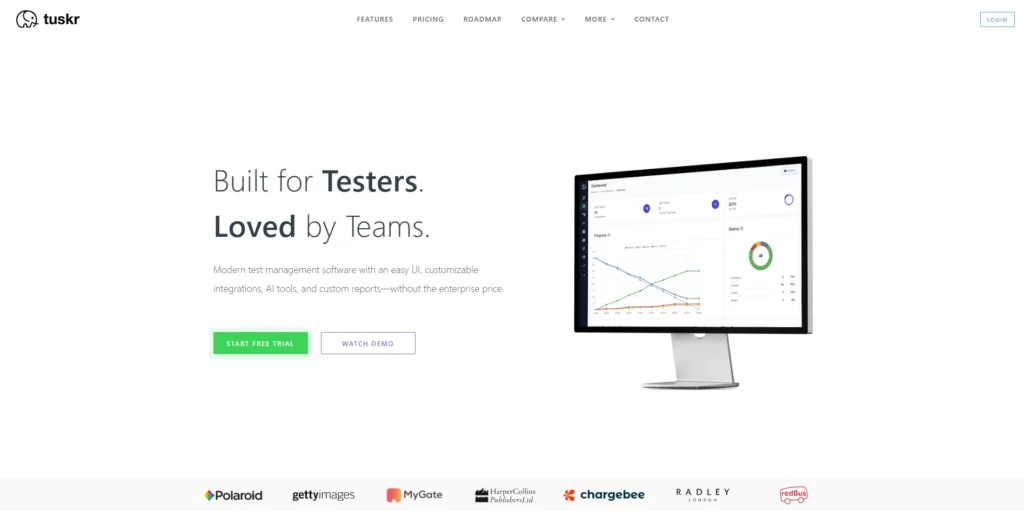
It is an up-to-date test management app that works online, Tuskr is designed to be effortless and potent. Better testing can also be done with aspects such as development of test cases, doing the test run, requirement mapping and overseeing defects.
The interface of Infinity is easy to deal with, it displays a lot of data insights and can operate harmoniously with JIRA and other helpful software. Since Tuskr is very simple and affordable, it can be used in small to medium-sized teams.
TestProject is a customised testing solution that simplifies both manual and scripted testing and puts the emphasis on collaboration. Lost a few business functions, and Tuskr has a basic look and experience at an affordable cost to groups.
Key Features:
- Support of the test cases, runs and plans in modern UI
- Tags, Attachments and Versions of the test case
- Jira, Trello, Slack, and GitHub integration Integration
- Advanced user rights and logs
- Support for export/import and REST API
- Status of automated tests updates
Pricing:
- Free
- Team Price-$ 9/month
- Business– $15/month
- Enterprise– $29/month
11. TestGear
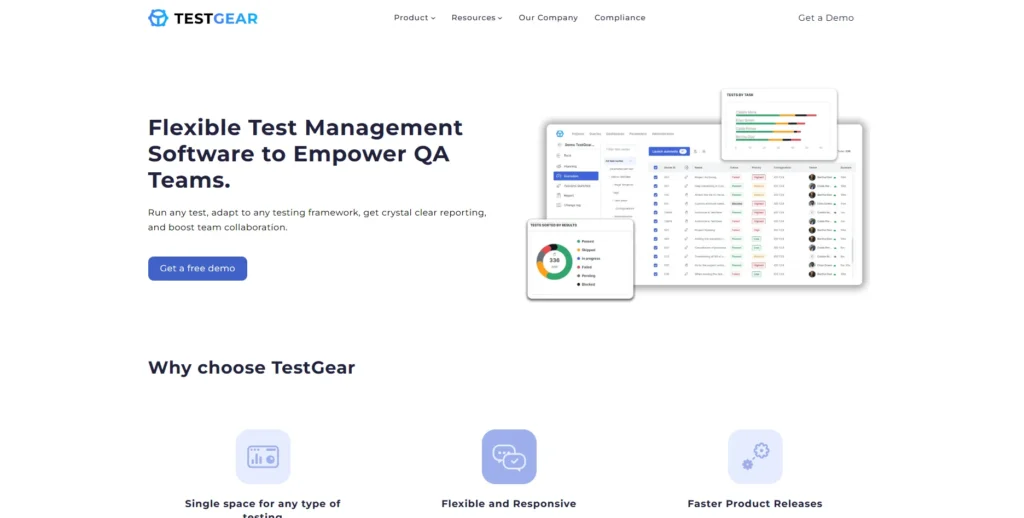
It is a test management tool of the next generation that is designed to support modern QA teams in managing manual and automated testing and exploratory testing with high efficiency. TestGear has collaboration and productivity to enable teams to build comprehensive test plans, store all test information in one place, and report on rich features. Integrated flawlessly with such popular tools as Jira, Azure DevOps, GitHub, and Jenkins, the teams can keep traceability throughout the development life cycle.
It offers user-friendly dashboards and allows BDD-form test generation of a behaviour-driven style. TestGear is distinguished by a modern user interface and supports multiple languages, so it will be a good solution for a widely distributed QA team. Its capability to integrate the agile testing procedure with an enterprise value positioning offers it the advantage over conventional tools such as TestLink.
Key Features:
- Autonomous manual and automated test registry
- Integration of CI/CD tools (Jenkins, GitHub, Azure DevOps)
- BDD support and scriptless test cases generation
- Audit logs and role-based access Role-based access
- Maximum analytics, dashboards
- Collaboration of the team in real-time
- Multilingual interface
Pricing:
- customised pricing
12. Qase
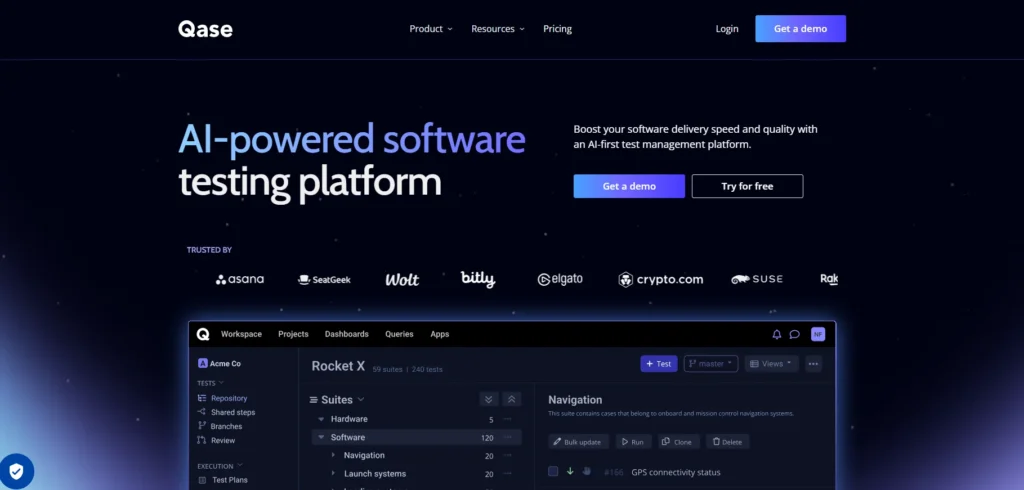
Qase is a contemporary cloud-based test management tool designed to support agile teams that need a lean, quick and collaborative test/QA process. It provides a clean user user-friendly interface and adds powerful features such as organising test cases, running test runs and generating reports in real time.
The strong API of this solution and smooth integration with CI tools (CircleCI, GitHub Actions, GitLab CI) and issue trackers (Jira, Trello, ClickUp) allow Qase to fit the contemporary DevOps pipelines. In-app commenting, role-based rights and adjustable alerts allow the collaboration of teams. Markdown support and webhooks help make the processes of QA as clear and adjustable as possible in Qase. It is ideal when speed and agility are required by startups and mid-size teams.
Key Features:
- Real-time collaboration with UI that is modern UI
- Simple Test execution and case handling
- Integration CI/CD and Jira/GitHub
- Markdown TC editor
- Personalizable roles and privileges
- REST API support and Webhook support
- Analytics and test result version control
Pricing:
- Free (until 3 users)
- Start up $20/ month
- Business -$30/month
- Enterprise -custom
13 Testiny
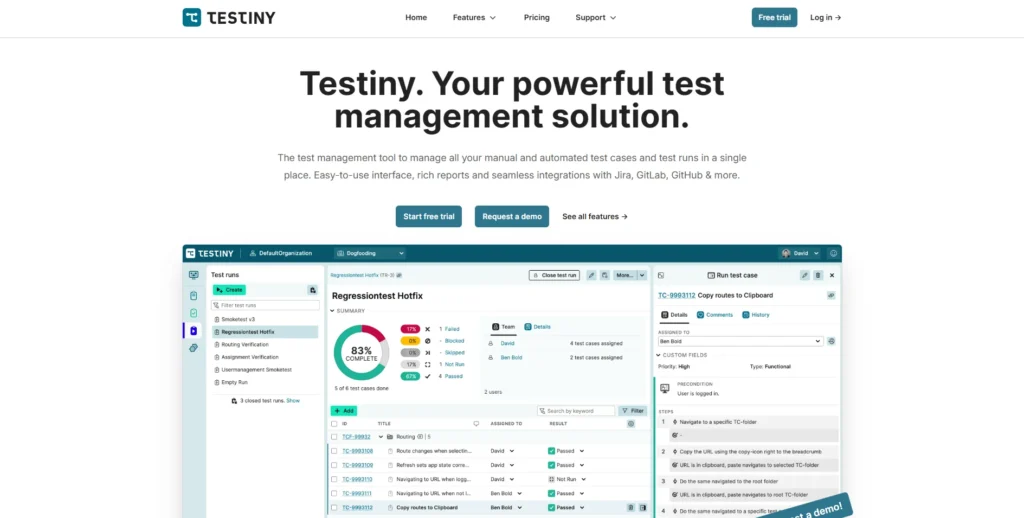
It is an intuitive, fast, and light test management tool to assist QA teams in the enhancement of the process of tests without an advanced approach. Teams with Testiny can quickly create and organise their tests and execute tests, and this is tracked and then gives a report that can be used. It facilitates real-time teamwork and successfully combines with Jira and the rest of the developer tools.
Supporting the tagging, prioritisation, and versioning of the test to facilitate test cycles is also supported by the tool. Its newest UI makes the learning curve minimal, and the interface is available only on the cloud with the GDPR compliance option, making it perfect to work with in European groups of people or companies with strict data regulations. Due to its simplicity and speed, Testiny is an intelligent selection when working on agile QA operations.
Key Features:
- Quick writing of test cases and mass updates
- Integration of Jira and external systems
- Tracking and reporting of test runs in real time
- Version control of tests and changes associated with it
- Filtering System and tagging
- Role-based permissions
- EU-hosting and GDPR-compliant one
Pricing:
- Starter free (2 users)
- Advanced -$14.50/month
- Custom- Enterprise
14. TestSigma
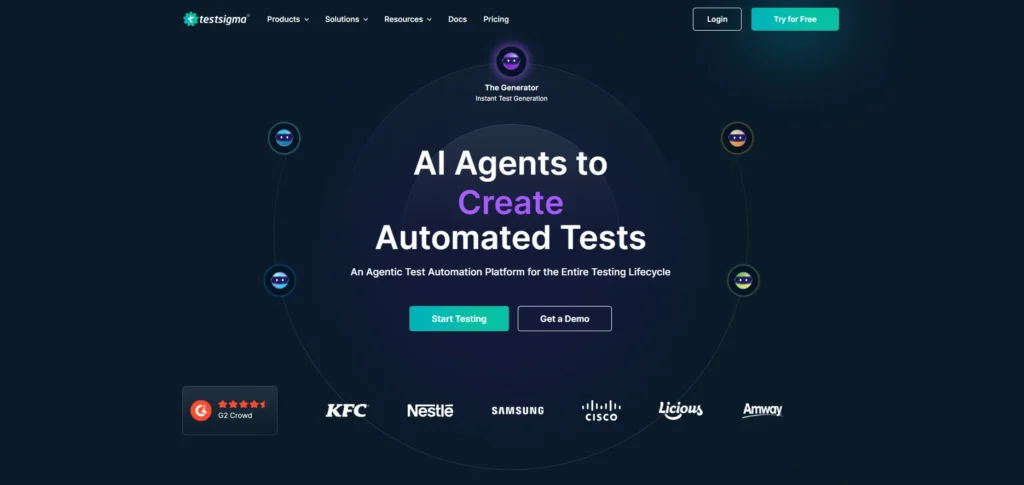
TestSigma is an AI test automation platform built with a cloud offering supporting comprehensive test management of modern QA teams. It enables you to write tests in plain English with the help of NLP, unlike traditional test tools that require knowledge of coding. It covers web, mobile and API testing in a single platform and it includes in-built integrations with CI/CD systems, bug tracking systems such as Jira, and collaboration systems.
Automated tests can be pre-scheduled or initiated using CI/CD applications. TestSigma reduces release cycles substantially as it offers both real-time reporting and reusable elements and smooth links. The interface is intuitive and can be applied to support manual and automated testing, which makes it a good performer among startups as well as enterprise-level companies.
Key Features:
- The creation of tests with the help of NLP (no-code)
- Single web, mobile and API test platform
- Reporting and collaboration in real-time
- In-store integration with Jira, Slack, Jenkins and GitHub
- Test environments that can be customised along with reusable components
- Cloud implementation and local test agent assistance
- Supports teams of large enterprises
Pricing:
- A free plan is offered
- Pro:$8/month
15. TestMonitor
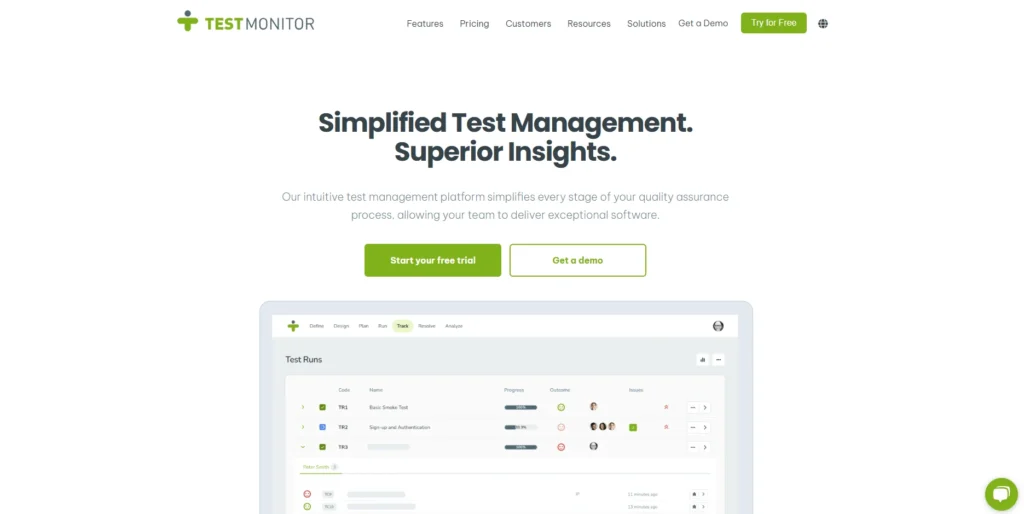
TestMonitor is a simple-to-use test management tool for technical as well as non-technical users. It covers all phases of the testing lifecycle i.e., test planning, test case designing, execution, tracking of issues and reporting. With simplicity and collaboration in mind, TestMonitor’s simple interface makes it easy for teams to plan and track QA projects without a complicated learning process.
It connects with project management software such as Jira, Azure DevOps and Asana. The software offers the features of requirement linking, risk-based testing and detailed reporting capabilities to monitor project health and quality. It’s a cloud-native and secure platform along with its cloud-based server deployment and infrastructure, is also preferred in SMB’s, and also for growing teams which want ease & scale of usage.
Key Features:
- Test planning, executing, and tracking the results
- Custom field, role and permission.
- Requirement-driven as well as risk-based testing
- Real-time collaboration, reporting dashboards
- Jira, Asana and Azure DevOps integration.
- Built-in issue management system
- Cloud-based as well as GDPR compliant
Pricing:
- Begin – $11/ a month.
- Professional – $16/month
- Enterprise – Quoting custom
Conclusion
Although TestLink has been a reliable test management tool in the QA field, there have been updated demands in current development production methods that need test tools that are more flexible, collaborative, and prepared to integrate. That’s where TestLink alternatives come into play. The range of tools starts with enterprise-level solutions such as Zephyr Enterprise and qTest, and extends to newer, easy-to-handle tools like Testmo, Qase, and Tuskr — ensuring there’s an option to suit every team’s workflow and scale.
It does not matter whether you are a small organisation, searching for cost-effectiveness and rapid completion, or you are a big company, seeking profound integrations and expandability; you can find a TestLink substitute abroad to improve your test coverage, personnel performance, and organizing transparency. The selection of the test management tool will greatly simplify your QA processes, automate moving forward, and deliver better quality software.
FAQs
1. What is the purpose of a test management tool?
A test management tool is used to manage test cases, bug tracking, and to oversee QA processes and software development.
2. What is the point of my making the switch to newer TestLink?
New ones provide enhanced integration, on-demand teamwork, automation utilisation, and UI modernisation to be more productive.
3. Does agile testing have a chance to be performed using these alternatives to TestLink?
Yes, the majority of alternatives are designed to facilitate agile and DevOps workflows and are integrated with CI/CD tools.
4. Do any free or cheap alternatives to TestLink exist?
Indeed, such tools as Qase, Tuskr, or Kualitee have free or affordable plans for small teams.
5. Can these tools be used to implement test automation?
Most of the tools have Selenium, Jenkins, GitHub, and other automation tools integration that simplifies the testing part.
